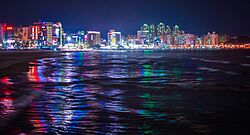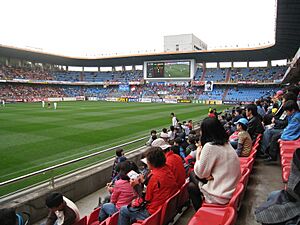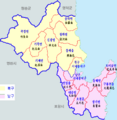Pohang facts for kids
Quick facts for kids
Pohang
포항시
|
||
|---|---|---|
| Korean transcription(s) | ||
| • Hangul | 포항시 | |
| • Hanja | 浦項市 | |
| • Revised Romanization | Pohang-si | |
| • McCune-Reischauer | P'ohang-si | |
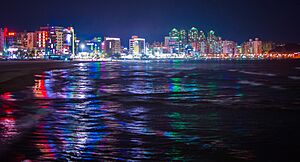
Pohang by night
|
||
|
||
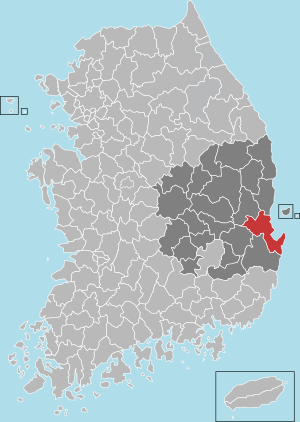
Location in South Korea
|
||
| Country | South Korea | |
| Region | Yeongnam | |
| Administrative divisions | 2 gu, 15 dong, 4 eup, 10 myeon | |
| Area | ||
| • Total | 1,128.76 km2 (435.82 sq mi) | |
| Population
(November, 2022)
|
||
| • Total | 499,363 | |
| • Density | 442.40/km2 (1,145.8/sq mi) | |
| • Dialect | Gyeongsang | |
| Demonym(s) | Pohangite | |
| Time zone | UTC+9 (Korea Standard Time) | |
| Area code(s) | +82-54-2xx | |
Pohang is a large city in South Korea. It is located in North Gyeongsang Province. As of 2022, nearly 500,000 people live there. The city borders the Sea of Japan to the east.
Pohang is known for its industries. These include food, textiles, and metal. Farmers grow grapes, persimmons, and garlic chives. The city's location by the sea helps its fishing industry. A local favorite food is hagfish.
The Korean Marine Corps has its 1st Division in Pohang. Their training center is also located here. Visitors can enjoy places like Jukdo Fish Market for fresh seafood. There are also beautiful beaches like Yeongildae, Wolpo, and Pohang Songdo. Naejangsan Mountain offers scenic views and twelve waterfalls.
Contents
History of Pohang
The first people lived in the Pohang area a very long time ago. This was during the Mumun Pottery Period (1500–300 BC). Archaeologists have found old villages and large stone tombs called dolmen.
In the early 1900s, Pohang was a small fishing village. A modern harbor was built in 1930. This helped the city grow quickly. It became a town (eup) in 1931 and a city (si) in 1949.
Pohang was important during the Korean War. Its roads and port were very useful. In July 1950, UN forces landed here. This was a big operation. The area also saw intense fighting between armies.
By the 1960s, Pohang had about 50,000 people. A major steel company, POSCO, started here in 1968. Their local factory began making steel in 1972. This brought heavy industry to the city. Pohang's economy then focused on iron, steel, shipbuilding, and fishing.
Today, Pohang is looking to the future. It wants to be more than just a heavy industry city. The city is working to become a leader in environmentalism and advanced learning. It also aims to be a center for arts and culture.
Pohang's Geography and Climate
Pohang has a humid subtropical climate. This means it has hot, humid summers and mild winters. The average temperature in January, the coldest month, is about 2.2 °C. August is the warmest month, with an average temperature of 26.0 °C.
Pohang gets about 1,152 mm of rain each year. December is the driest month. August is the wettest month, with a lot of rain.
| Climate data for Pohang (1991–2020 normals, extremes 1943–present) | |||||||||||||
|---|---|---|---|---|---|---|---|---|---|---|---|---|---|
| Month | Jan | Feb | Mar | Apr | May | Jun | Jul | Aug | Sep | Oct | Nov | Dec | Year |
| Record high °C (°F) | 17.5 (63.5) |
24.9 (76.8) |
26.9 (80.4) |
32.8 (91.0) |
36.1 (97.0) |
37.7 (99.9) |
38.6 (101.5) |
39.3 (102.7) |
35.9 (96.6) |
30.5 (86.9) |
28.0 (82.4) |
21.5 (70.7) |
39.3 (102.7) |
| Mean daily maximum °C (°F) | 6.7 (44.1) |
9.0 (48.2) |
13.3 (55.9) |
19.1 (66.4) |
23.5 (74.3) |
25.8 (78.4) |
29.0 (84.2) |
29.5 (85.1) |
25.5 (77.9) |
21.4 (70.5) |
15.4 (59.7) |
8.9 (48.0) |
18.9 (66.0) |
| Daily mean °C (°F) | 2.2 (36.0) |
4.3 (39.7) |
8.6 (47.5) |
14.1 (57.4) |
18.6 (65.5) |
21.8 (71.2) |
25.4 (77.7) |
26.0 (78.8) |
21.9 (71.4) |
16.9 (62.4) |
10.6 (51.1) |
4.3 (39.7) |
14.6 (58.3) |
| Mean daily minimum °C (°F) | −1.5 (29.3) |
0.2 (32.4) |
4.2 (39.6) |
9.6 (49.3) |
14.4 (57.9) |
18.6 (65.5) |
22.5 (72.5) |
23.3 (73.9) |
18.9 (66.0) |
13.1 (55.6) |
6.6 (43.9) |
0.5 (32.9) |
10.9 (51.6) |
| Record low °C (°F) | −14.4 (6.1) |
−13.4 (7.9) |
−9.9 (14.2) |
−2.3 (27.9) |
3.7 (38.7) |
8.2 (46.8) |
10.8 (51.4) |
14.0 (57.2) |
8.9 (48.0) |
0.6 (33.1) |
−8.3 (17.1) |
−13.1 (8.4) |
−14.4 (6.1) |
| Average precipitation mm (inches) | 39.8 (1.57) |
36.5 (1.44) |
60.5 (2.38) |
81.2 (3.20) |
84.6 (3.33) |
126.8 (4.99) |
200.6 (7.90) |
230.2 (9.06) |
189.3 (7.45) |
76.7 (3.02) |
40.1 (1.58) |
26.1 (1.03) |
1,192.4 (46.94) |
| Average precipitation days (≥ 0.1 mm) | 5.7 | 5.9 | 8.5 | 8.2 | 8.5 | 9.7 | 13.7 | 13.5 | 11.3 | 6.4 | 6.2 | 4.7 | 102.3 |
| Average snowy days | 2.1 | 2.2 | 1.1 | 0.0 | 0.0 | 0.0 | 0.0 | 0.0 | 0.0 | 0.0 | 0.2 | 1.5 | 7.1 |
| Average relative humidity (%) | 48.8 | 50.8 | 55.4 | 57.1 | 64.1 | 73.9 | 78.3 | 78.6 | 75.3 | 65.1 | 57.4 | 49.9 | 62.9 |
| Mean monthly sunshine hours | 191.4 | 185.1 | 203.8 | 219.3 | 230.9 | 189.2 | 168.5 | 178.5 | 160.9 | 199.7 | 185.0 | 191.2 | 2,303.5 |
| Percent possible sunshine | 60.8 | 57.5 | 51.2 | 54.4 | 51.3 | 42.0 | 36.2 | 40.7 | 41.5 | 55.4 | 59.3 | 63.0 | 50.1 |
| Source: Korea Meteorological Administration (percent sunshine 1981–2010) | |||||||||||||
How Pohang is Organized
Pohang has a mayor who leads the city. There are different offices and departments. These help manage things like administration, economy, welfare, and city planning. They also handle public health, water supply, and cultural centers.
Getting Around Pohang
You can travel to Pohang by train from Seoul and Daegu. The city is also a hub for ferries. These ferries go to islands like Ulleung Island and Liancourt Rocks.
Pohang is home to POSCO, a huge steel company. This means the port is very busy. In 2006, it shipped over 54 million tons of goods.
You can also fly to Pohang. Pohang Gyeongju Airport has flights to Seoul Gimpo Airport and Jeju Airport.
Within the city, buses are the main way to get around. There are about 20 different bus routes. Buses run every 15-25 minutes. You can find bus routes online in Korean and English.
Pohang has two main bus terminals. The Shiwae terminal connects to nearby cities like Daegu and Busan. The Gosok terminal offers express buses to Seoul and Gwangju.
There are also two train stations: Pohang station and Wolpo station. Since 2015, the KTX high-speed train goes directly to Pohang station. You can check train times on the Korail website.
Education in Pohang
Pohang has several places for higher education.
Universities with Graduate Schools
- Pohang University of Science and Technology (POSTECH)
- Handong Global University
Other Colleges
- Pohang College
- Sunlin College
Pohang's Culture
Every summer, thousands of people come to Yeongildae Beach. They gather to watch a spectacular fireworks festival. People travel from all over Korea to see this amazing show.
The Culture & Arts Center opened in 1995. It hosts many performances and art exhibitions. Pohang is also famous for a dried fish called gwamegi. The city holds an annual Gwamegi Festival in November. This festival lets people experience old Korean traditions.
Museums to Visit
- Guryongpo Gwamegi Culture Museum
- Guryongpo Modern History Museum
- The National Lighthouse Museum
- Yeongil Folk History Museum
- The Posco Museum
- Pohang Museum Of Steel Art
- Pohang Canal PR Hall
- Robo Life Museum
Monuments and Memorials
- Sabang Memorial Park
- Saemaul Memorial Hall
- New Millennium Memorial Hall
Villages to Explore
- Deokdong Culture Village
- Duksil Village
- Sangok-ri
Fun Experiences
- Botanical Garden of Gyeongsangbukdo
- Yeonorang Seonyeo Theme Park
- Key-Chungsan Botanical Garden
- Yeongilman Cruise
- Pohang Ship Experience
Other Important Places
- Posco
- Pohang Accelerator Laboratory
- Korea Institute of Robotics & Technology Convergence
Industry in Pohang
Pohang is a major center for the steel and metal industry. POSCO is one of the largest steel producers in the world. Many other related businesses are also located here.
Sports in Pohang
Pohang is home to the Pohang Steelers. This is a professional football team that plays in K League 1. The city also has the Pohang Baseball Stadium. The Samsung Lions baseball team sometimes uses it as their second home stadium.
Places to See in Pohang
The Jukdo Market is a big, busy traditional market. It is close to the city center and the port. This market is famous across Korea for its fresh seafood. You can find many restaurants selling raw fish here. The fish is often cheaper than in Seoul or Daegu.
Bukbu Beach is in the northern part of the city. It has many shops, restaurants, and places to stay. North of the city, you can find other beaches like Chilpo and Wolpo.
Homigot is a piece of land that sticks out into the Sea of Japan. It is one of the easternmost points in Korea. Thousands of people gather here every New Year's Day. They come to see Korea's first sunrise. The beach also has a sculpture called 'Hands of Harmony'.
Bogyeongsa is a large Buddhist temple. It is located in a beautiful valley at the foot of Mount Naeyeon. You can find Yeonsan Waterfall nearby. There are also hiking trails that lead from the temple into the mountains.
Oeosa is another temple in the southern part of Pohang. It is in a valley at the foot of Mt. Unjae. Signs at Oeosa say that a famous monk named Wonhyo founded the temple.
Space Walk is a unique art installation. It looks like a roller coaster that you can walk on. It was built by POSCO from 317 tons of steel. The Space Walk opened in 2021 in Hwanho Park.
Famous People from Pohang
- Lee Myung-bak, a former South Korean President
- Lee Ho-yang (known as Shinsadong Tiger), a music producer
- Chan Sung Jung, a UFC fighter
- Song Ji-hyo, an actress and TV star
- Ray, from the boy band C-Clown
- Lee Dong-gook, a soccer player
- JinE (Shin Hye-jin), former member of the girl band Oh My Girl
- Lee Chaeyoung, from the girl band Fromis 9
- Kang Yeosang (Yeosang), from the boy band ATEEZ
- Yoo Seung-ho, an actor
- Lee Jaehyeong (Jaehyeong), from the rock band The Rose
- Kim Yong-seung (Yongseung), from the boy band VERIVERY
- Bae Sumin (Sumin), leader of the girl band STAYC
Shopping in Pohang
The main shopping area is between Yukgeori and Ogeori. These are two big intersections. There's also a shopping area along a streamlet boardwalk. You can find many stores, restaurants, and bars there.
Images for kids
Twin Towns – Sister Cities
Pohang has special connections with other cities around the world. These are called "sister cities."
 Fukuyama, Japan
Fukuyama, Japan Hunchun, China
Hunchun, China İzmit, Turkey
İzmit, Turkey Jōetsu, Japan
Jōetsu, Japan Pittsburg, United States
Pittsburg, United States Vladivostok, Russia
Vladivostok, Russia
Friendly Cities
Pohang also works closely with these cities:
See also
 In Spanish: Pohang para niños
In Spanish: Pohang para niños
 | Anna J. Cooper |
 | Mary McLeod Bethune |
 | Lillie Mae Bradford |



